- Home
- Stephen Hunt
The Court of the Air j-1 Page 2
The Court of the Air j-1 Read online
Page 2
‘Now Molly,’ began the Beadle, his lazy con-man’s eyes blinking. ‘Sit down here and I will introduce you to our guest.’
Molly prepared her best barrack-room lawyer’s face. ‘Yes, sir.’
‘Molly, this is Damson Emma Fairborn, one of Sun Gate’s most prominent employers.’
The lady smiled at Molly, pushing back at the curl of her blonde bob, streaked by age with a spray of platinum silver now. ‘Hello Molly. And do you have a last name?’
‘Templar,’ said the Beadle, ‘for the-’
The lady crooked a finger in what might have been displeasure and amazingly the Beadle fell silent.
‘Molly, I am sure you can speak for yourself …’
‘For the Lump Street temple, where the Aldermen found me abandoned, wrapped in a silk swaddle,’ Molly said.
‘Silk?’ smiled Damson Fairborn. ‘Your mother must have been a lady of some standing to have thrown good silk away. A dalliance with the downstairs staff, or perhaps an affair?’
Molly grimaced.
‘But of course, I am sure you have dwelt on the identity of your parents at some length. There is not much else to occupy the mind in a place like this, after all.’
A sudden shocking thought gripped Molly, but the lady shook her head. ‘No, Molly. I am not she; although I suppose I am of an age where you could be my daughter.’
The Beadle harrumphed. ‘I should warn you, Molly has something of a temper, damson. Or should I say temperament.’ ‘To match her wild red hair, perhaps?’ smiled the lady. ‘And who would not, stuck in this damp place? Denied fine clothes, good wine, the company of gallants and a polite hand of whist? I am quite sure I would not find my temperament improved one whit if our positions were reversed.’
The Beadle glared at Molly, then looked at the lady. ‘I don’t-’
‘I believe I have heard enough from you, Beadle,’ said Emma Fairborn. ‘Now then, Molly. Would you do me the favour of bringing me that book over there?’
Molly saw the leather-bound volume she was pointing to on one of the higher of the Beadle’s bookshelves. She shrugged, walked over to the shelf and slid the book out. She blew the dust off the top. Pristine. Some work of philosophy kept for impressing visitors with the weight of the Beadle’s intellect. Then she walked over to where the lady was sitting and passed the work across.
Damson Fairborn gently held Molly’s hand for a second before turning it over and examining it like a gypsy palm reader. ‘Thank you, Molly. I am so glad that your tenure in the employ of that Snell woman was brief. Your hands are far too nice to be ruined by bleach.’ She placed the book down beside her. ‘And you have a good sense of balance for someone with your height. A shade over five and a half feet I would say.’
Molly nodded.
‘My dear, you have no idea how many pretty girls I meet who clump around like shire horses at a country fair, or waddle like a duck with the bad fortune to have been dressed in a lead corset. I think I can work with you. Tell me, Molly, have you enjoyed your time here at the house?’
‘I have found it … somewhat wearisome, damson,’ Molly replied.
She seemed amused. ‘Indeed, have you? You have quite an erudite turn of phrase for someone raised between these walls.’
‘The last director here was a Circlist, Damson Fairborn,’ said the Beadle. ‘She had the children in classes well past the statutory age, flouting the Relief of the Poor Act.’
‘A mind is the hardest thing to improve and the easiest thing to waste,’ said the lady. ‘And you, Molly. You have received no salary for these labours, I presume?’
‘No, damson,’ Molly answered. ‘It all goes to the Sun Gate Board of the Poor.’
Damson Fairborn nodded in understanding. ‘Yes, I am sure I would be amazed at how expensive the ward’s Victualling Board can buy in the cheapest kitchen slops. Still-’ she looked directly at the Beadle ‘-I am sure the suppliers have their overheads.’
The Beadle positively squirmed behind his writing desk.
‘Well, my dear.’ Damson Fairborn adjusted the short silk-print wrap draped around her jacket’s shoulders. ‘You will do. I think I can pay you a handsome stipend once the poor board’s monthly fees have been accounted for.’
Molly was shocked. If there was an employer who was paying the poorhouse’s dole and adding on an extra salary for the boarders, it was a first for the Sun Gate workhouse. The whole rotten idea of the poorhouse was as a source of cheap labour for the ward.
‘She’s an orphan, mind,’ reminded the Beadle. ‘She reaches her maturity in a year and then she’s a voter. I can only transfer her ward papers to you for twelve months.’
The lady smiled. ‘I think after a year with me our young lady’s tastes will be expensive enough that she won’t wish to return to working for your Handsome Lane concerns.’
Molly followed her new employer out onto the street, leaving the dank Sun Gate workhouse to the Beadle and his minions. The lady had a private cab waiting for her, the horses and carriage as jet-black as the livery of the squat, bullet-headed retainer standing beside them.
‘Damson Fairborn,’ Molly coughed politely as the manservant swung open the cab door.
‘Yes, my dear.’
Molly indicated the high prison-like walls of the poorhouse behind them. ‘This isn’t the usual recruiting ground for a domestic’
Her new employer looked surprised. ‘Why, Molly, I don’t intend you for an undermaid or a scullery girl. I thought you might have recognized my name.’
‘Your name?’
‘Lady Fairborn, Molly. As in my establishment: Fairborn and Jarndyce.’
Molly’s blood turned cold.
‘Of course,’ the lady winked at her heavily muscled retainer, ‘Lord Jarndyce is sadly no longer with us. Isn’t that so, Alfred?’
‘A right shame, milady,’ replied the retainer. ‘Choked on a piece of lobster shell during supper, it was said.’
‘Yes, Alfred. That was really rather careless of him. One of the very few occurrences of good living proving harmful to one’s constitution, I should imagine.’
Molly’s eyes were still wide with shock. ‘But Fairborn and Jarndyce is-’
‘A bawdyhouse, my dear. And I, not to place too delicate a sensibility on it, am widely known as the Queen of the Whores.’
The retainer stepped behind Molly, cutting off her escape route down the street.
‘And you, Molly. I think you shall do very nicely indeed as one of my girls.’
Back in the Beadle’s office the Observer faded into the reality of the poorhouse. She was allowed only one intervention, and it had been one of her best. Small. As it had to be. Hardly an intercession at all.
Originally the Beadle had been intending to rent Molly’s ward papers to the large abattoir over on Cringly Corner; but that reality path would have seen Molly returned, dismissed for insubordination, and back in the poorhouse within six weeks. Which would not have been at all beneficial for the Observer and her designs.
It had been so easy to nudge the Beadle’s brain a degree to the side, letting the new plan form in his imagination. Harder to push Emma Fairborn’s steel trap of a mind, but still well within the Observer’s intervention tolerances. The Beadle was sitting behind his desk now, working out how much graft was due in by the end of the week.
The Observer made sure everything was tidy and accounted for in the man’s treacle-thick chemical soup of a mind. Something, a sixth sense perhaps, made the Beadle scratch the nape of his neck and stare directly at where the Observer was standing. She increased the strength of her infiltration of his optic nerve, erasing even her background presence, comforting the small monkey brain back into a state of ease. Silver and gold, think about the money. The Beadle shuffled his papers into a neat stack and locked them away in his drawer. It was going to be a good take again this week.
The Observer sighed and faded back out of reality. Sadly, the Beadle was not going to live long enough to purchase that
twelfth cottage by the coast to add to his burgeoning property empire. She could have saved him. But then there were some interventions the Observer was glad she was not required to make.
Chapter Two
The aerostat field at Hundred Locks was slowly filling up with passengers awaiting the Lady Hawklight’s arrival. Oliver checked his trouser pocket. The description of his uncle’s guest still lay crumpled in there.
‘Oliver.’ A voice diverted his attention away from his uncle’s errand — Thaddius. A boy he had known from school. When Oliver had still been allowed to attend school, of course.
In the way of the young everywhere, the lad’s nickname was Slim, because he was anything but. The portly Thaddius had about as many friends in Hundred Locks as Oliver. At least, as many friends as Oliver had been left with, after the word had spread about what he really was … or might become.
‘Tail spotting?’ asked Oliver.
‘Tail spotting,’ confirmed Thaddius, his portly cheeks spreading in a grin. He showed Oliver his open book, neatly criss-crossed by a pencilled grid. ‘See, I got the Lady Darkmoor’s tail code last week. She normally operates on the Medfolk-to-Calgness run, but the merchant fleet are introducing the new Guardian Cunningham class in the south, so some of the uplander airships are being reallocated here now.’
Oliver nodded out of politeness. Thaddius was desperate to join the Royal Aerostatical Navy but his family had too little money to purchase him a commission, and just a little too much to countenance him ever signing up as a humble jack cloudie. Poor fat Thaddius was going to follow the family trade and become a butcher with his father and brothers, spending his evenings at the field, wistfully watching the graceful airship hulls sailing in and out. Dreaming of what might have been. And soon too. There were only three months to go before Thaddius and his classmates left the gates of the local state school for the last time.
‘Fieldsmen to the line,’ cried one of the green-uniformed airship officers and a burly gang of navvies took position, making a cigar-shaped outline on the grass. A pair of large dray horses walked to the nose of the formation to stand alongside the field’s tractor-like steamman; ready to provide the heavy muscle. The steamman hardly looked up to the job. His name was Rustpivot, and he had been a worker at the field when Oliver’s Uncle Titus was a boy. As large as two wagons, his boiler belly was bordered by six spiked wheels. Despite his advanced years, the steamman could still reach out with any of his four arms to tow an aerostat back into lift position.
‘Those with passage booked, please make sure you have your tickets to hand,’ called an official.
Oliver sighed. Travel.
Thaddius looked at him and read his mind. ‘They can’t keep you registered forever, Oliver. They’ve either got to pass you, or, well, you know…’ his voice trailed off.
‘They’re never going to pass me,’ Oliver spat. ‘They enjoy keeping me prisoner here too much.’
Thaddius fell quiet. The woes of his approaching family apprenticeship were put into perspective for him, set against the alternative prospects faced by his companion on the airship field. Remaining an outcast. Marked out. Gossiped about. Unable to travel further than was allowed by the state’s requirement that he sign on every week. Thaddius gave him a long look of sympathy, then left for the airship hangar to join the gang of tail spotters waiting by the doors.
From the south the wheezing heave and fall of a quartet of expansion engines hushed the noise of the waiting crowd. The airship rose out of the forest behind the field, the top half of her hull painted merchantman green, the bottom half a bright checkerboard of yellow and black squares.
The Lady Hawklight dipped her nose and sailors threw open hatches along the side of the gondola, casting down lines weighted with lead heads towards the ground. The fieldsmen caught these and the airship’s massive envelope was dragged towards the docking tower, the aerostat’s nose pulled with a loud hollow clank into her capture ring. Now she was fixed, the lines from the aerostat were wound into pulleys and the airship was drawn down to her hover-side position ten feet above the field.
The docking tower sat on a single iron rail. If the airship’s plan of flight included a berth for the night, both tower and ship would eventually be drawn back into the hangar at the far end of the field where Thaddius and the other children eagerly waited. Disembarkation stairs were pushed up to the gondola doors and wagons carrying ballast water and precious cylinders of celgas drew up on her starboard side.
The usual pool of passengers with business in Hundred Locks began to disembark. Half the travellers were foreigners from outside the Kingdom of Jackals, the white togas from the city-states of the Catosian League clashing with the brightly multicoloured ponchos of the Holy Kikkosico Empire. Neither country allowed Jackelian airships to overfly their lands, suspicious of the Kingdom’s monopoly on air travel and the opportunities for reconnaissance it provided. The foreigners would travel by canal navigation to the head of Toby Fall Rise, and from there return home by schooner and ferry across the Sepia Sea.
There were archaeologists in the group too, from one of the eight great universities, easily conspicuous by the leather cases they carried, filled with fine tools that they would not want to risk to the movements and shifts of the cargo hold. They were still arguing over whether the colossal dike that overshadowed the town was a natural freak of nature or some feat of an ancient civilisation.
Oliver put his hands into his pockets for warmth, and finding the note, suddenly remembered the reason for his visit to the aerostat field. His uncle’s guest!
Most of the arrivals had already dispersed. The queue of passengers boarding the Lady Hawklight thinned to a few late arrivals. Out on the field the local boys had set up a game of four-poles, the amateur fast-bowling watched with amused detachment by the officers from the aerostat as they waited for the airship to take on her full load of celgas and ballast water.
A peddler was hawking to the remaining passengers from the Holy Kikkosico Empire, a smoke-filled glass bottle hanging on his chest, offering six breaths of mumblesmoke for a ha’penny. The ranks of barouche-and-fours had emptied too, the small horse-drawn coaches taking any willing travellers through the small crowded town and up to the Hundred Locks canal navigation from which the settlement took its name.
Among the stragglers stood one man who fitted the crumpled description Oliver’s uncle had dashed out that morning from his desk. He was thin, a touch under Oliver’s height of six foot, and also possessed a shock of dark blond hair cut short and ragged. What the description had omitted were the dark iron glasses that rested across the bridge of his nose. Cheap milled fare, they had never graced the exclusive shelves of any optician back in the capital.
Oliver was well used to guiding visitors from the field and across to his uncle’s home at Seventy Star Hall, but they were normally well-to-do merchants like Titus Brooks himself. His warehouse in Shipman Town swelled with barrels of empire wine, city-state contraptions and — it was rumoured — brandy still smuggled through Quatershift, a trade legal for hundreds of years but now forbidden in both Quatershift and Jackals since the end of the Two-Year War.
The man Oliver was staring at looked more like the cheaply dressed clerk of a parish council. Oliver walked over to him. ‘Mister Stave?’
‘Harry,’ said the man, extending his hand to Oliver. ‘Harry Stave. The last time I was called mister anything was-’ he looked at Oliver and thought better of the tale ‘-well, a long time ago, let’s say. Just call me Harry.’
‘My uncle is expecting you, Harry.’ Oliver pointed towards the town.
‘I don’t doubt he is, old stick. But my luggage, such as it is, is still coming off the Lady Hawklight.’
A cushion of hemp netting was assembled underneath the gondola’s cargo hatch, set up to take the royal mail sacks, scarlet with their KoJ seal, a lion resting underneath the portcullis of the House of Guardians. A steamman was pulling a trolley away from the airship’s shadow, piled hi
gh with crates, packages and travel chests.
‘You’re not exactly travelling light.’
‘Just the one,’ said Harry, lifting off a battered ivory-handled travel box. ‘And there we are.’
Each of the visitor’s words was carefully nuanced, as if Harry were polishing each vowel before saying it. They belied the otherwise rough appearance of the man. Oliver offered to take the case, but Harry shook his head. ‘You work for Titus?’
‘He’s my uncle. I suppose I do.’
‘Ah, well then.’ Harry stopped to look at Oliver as they left the field. ‘Young Master Brooks. Perhaps I should have recognized you. Although there’s not much about the babe that I see in the man.’
That made Oliver start. ‘You knew my parents?’
‘That I did, Oliver. My trade sometimes put me in the path of your father and mother. You were nearly sick on me once, as a swaddling. Do you remember either of them?’
‘No. Not at all.’ Oliver could not keep the pain out of his voice. ‘My uncle. He doesn’t talk about them.’
‘It’s as hard to lose a brother as a father, old stick,’ said Harry, gently. Seeing the effect the conversation was having on Oliver, he stopped. ‘Let’s not talk of it either, then. We’ll allow those who have moved along the Circle to rest in their new lives.’
Oliver wondered if his uncle’s visitor knew he was registered. Probably. If he had known his parents, he would have heard the stories of what had happened to them. And to Oliver. If it bothered Harry, he did not show it.
They were in town now. Seventy Star Hall lay beyond Hundred Locks proper, nestled at the foot of the hills that led up to the Toby Fall Rise. A dog tied to a post outside the fish market was barking as dockers down from Shipman Town arrived to find evening lodgings at the inns and drinking houses, their heavy steel-capped boots clattering against the cobblestones.
The talk of his parents had lowered Oliver’s mood. So this was to be the map of his life, then. Allowed no proper trade or apprenticeship. Signing onto the county registration book once a week. Shunned by most of the townspeople. Running small errands for his uncle to keep him busy and out from under his relative’s feet. Unable to leave the parish boundaries without being declared rogue and hunted down. Denied those simple freedoms that even the fox in the burrow or the swallow in the tree took for granted. An object of pity, perhaps; charity, on his uncle’s part; aversion from those who were once his friends and fellows.

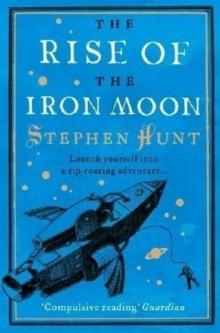 The Rise of the Iron Moon
The Rise of the Iron Moon Empty Between the Stars (The Songs of Old Sol Book 1)
Empty Between the Stars (The Songs of Old Sol Book 1)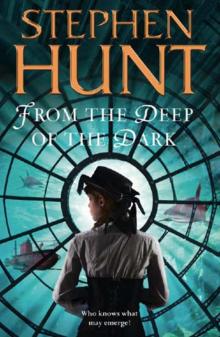 From the Deep of the Dark
From the Deep of the Dark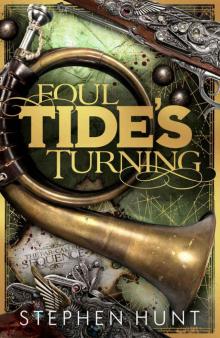 Foul Tide's Turning
Foul Tide's Turning Transference Station
Transference Station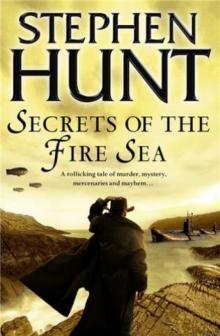 Secrets of the Fire Sea j-4
Secrets of the Fire Sea j-4 Void All The Way Down: The Sliding Void Omnibus
Void All The Way Down: The Sliding Void Omnibus The Kingdom Beyond the Waves j-2
The Kingdom Beyond the Waves j-2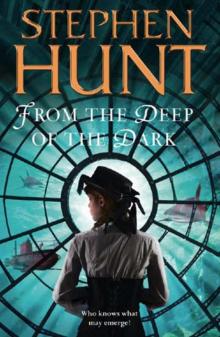 From the Deep of the Dark j-6
From the Deep of the Dark j-6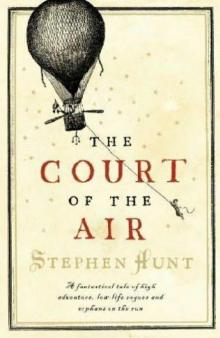 The Court of the Air
The Court of the Air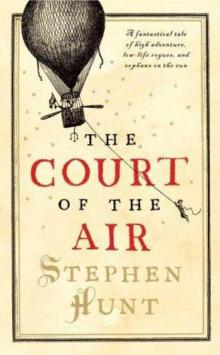 The Court of the Air j-1
The Court of the Air j-1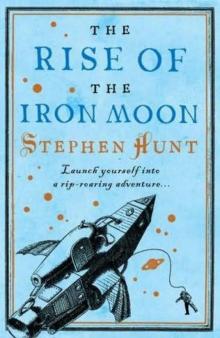 The rise of the Iron Moon j-3
The rise of the Iron Moon j-3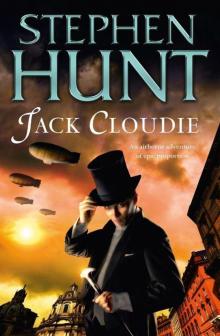 Jack Cloudie j-5
Jack Cloudie j-5 The Kingdom Beyond the Waves
The Kingdom Beyond the Waves The Stealers' War
The Stealers' War In Dark Service
In Dark Service